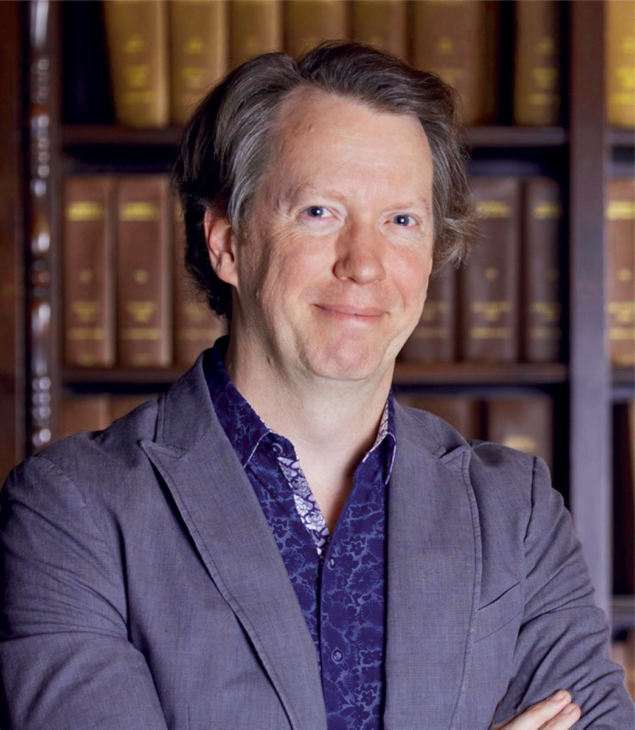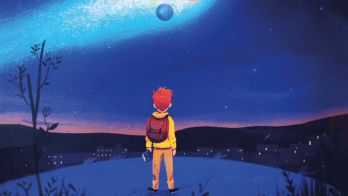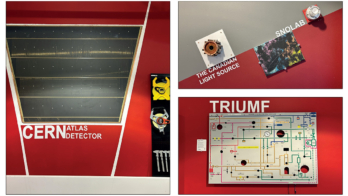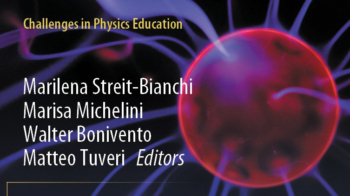Caltech theorist Sean Carroll describes the pros and cons of a side career as a popular science author and podcaster.

On 4 July 2012, Sean Carroll was at CERN to witness the momentous announcements by ATLAS and CMS – but not in his usual capacity as a physicist. He was there as an accredited member of the media, sharing an overflow room with journalists to get first-hand footage for the final chapter of his book. The Particle at the End of the Universe ended up being the first big title on the discovery and went on to win the 2013 Royal Society Science Books Prize. “It got reviewed everywhere, so I am really grateful to the Higgs boson and CERN!”
Carroll’s publisher sensed an opportunity for a timely, expert-authored title in 2011, as excitement in ATLAS and CMS grew. He initially said “No” – it wasn’t his research area, and he preferred to present a particular point of view, as he did in his first popular work From Eternity to Here: The Quest for the Ultimate Theory of Time. “With the Higgs boson, there is no disagreement, he says. “Everyone knows what the boson is, what it does and why is it important.” After some negotiation, he received an offer he couldn’t refuse. It also delved into the LHC, the experiments and how it all works, with a dash of quantum field theory and particle physics more generally. “We were hoping the book would come out by the time they announced the discovery, but on the other hand at least I got to include the discovery in the book, and was there to see it.”
Show me the money
Books are not very lucrative, he says. “Back in the 1980s and 1990s, when the success of Hawking’s A Brief History of Time awoke the interest of publishers, if you had a good idea for a physics book you could make a million dollars. But it is very hard to earn enough to make a living. “It takes roughly a year, or more depending on how much you have to learn, and depends on luck, the book and the person writing it.” His next project is a series of three books aimed at explaining physics to the general reader. The first, The Biggest Ideas in the Universe: Space, Time and Motion, due out in September, covers Newtonian mechanics and relativity; the second covers quantum mechanics and quantum field theory, and the third complexity, emergence and large-scale phenomena.
Meanwhile, Carroll’s podcast Mindscape, in which he invites experts from different fields to discuss a range of topics, has produced 200 episodes since it launched in 2018 and attracts around 100,000 listeners weekly. “I thought that it was a very fascinating idea, basically your personal radio show, but I quickly learned that I didn’t have that many things to say all by myself,” he explains. “Then I realised it would give me an excuse to talk to lot of interesting people and stretch my brain a lot, and that worked out really well.”
Reaching out
As someone who fell in love with science at a young age and enjoyed speaking and writing, Carroll has clearly found his ideal career. But stepping outside the confines of research is not without its downsides. “Overall, I think it has been negative actually, as it’s hard for some scientists to think that somebody is both writing books and giving talks, and also doing research at the same time. There is a prejudice that if you are a really good researcher then that’s all you do, and anything else is a waste of time. But whatever it does to my career, it has been good in many ways, and I think for the field, because I have reached people who wouldn’t know about physics otherwise.”
We need to take seriously the responsibility to tell people what it is that we have learned about the universe, and why it’s exciting to explore further
Moreover, he says, scientists are obligated to communicate the results of their work. “When it comes to asking the public for lots of money you have to be able to explain why it’s needed, and if they understand some of the physics and they have been excited by other discoveries they are much more likely to appreciate that,” he says, citing the episode of the Superconducting Super Collider. “When we were trying to build the SSC, physicists were trying their best to explain why we needed it and it didn’t work. Big editorials in the New York Times clearly revealed that people did not understand the reasons why this was interesting, and furthermore thought that the kind of physics we do does not have any immediate or technological benefit. But they are all also curious like we are. And while we don’t all have to become pop-science writers or podcasters (just like I am not going to turn up on Tik Tok or do a demo in the street), as a field we really need to take seriously the responsibility to tell people what it is that we have learned about the universe, and why it’s exciting to explore further.”





